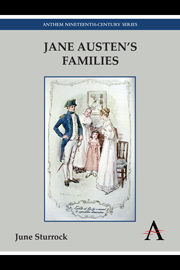Conclusion: “Creative Attention”
Summary
In concluding Jane Austen's Families, I turn first to Austen's own endings, for the family continues to play a significant role right into the last pages, even the last sentences, of her novels. These endings show a persistent imaginative engagement with the complex emotional and moral lives of her characters in the context of their communities. While Austen's closing chapters establish the happy marriages that genre and reader expectations require, they also show other elements in the future lives of her central characters, usually emphasizing the ongoing interactions between the heroines and their families or friends, a narrative element that is sometimes overshadowed by the generic satisfactions of the weddings.
The last chapter of Sense and Sensibility brings about the necessary two happy marriages for its two heroines. Tellingly, however, its last paragraph is concerned not so much with these marriages as with family relationships, confirming the continuing closeness of the Dashwood family. Although the narrator notes with approval Mrs Dashwood's “prudent” decision to retain an independent home for herself and her youngest daughter in Barton when both her elder daughters live at Delaford, the four women remain interdependent, as they have always been:
Between Barton and Delaford, there was that constant communication which strong family affection would naturally dictate; – and among the merits and the happiness of Elinor and Marianne, let it not be ranked as the least considerable, that though sisters, and living almost within sight of each other, they could live without disagreement between themselves, or producing coolness between their husbands.
- Type
- Chapter
- Information
- Jane Austen's Families , pp. 111 - 118Publisher: Anthem PressPrint publication year: 2013



